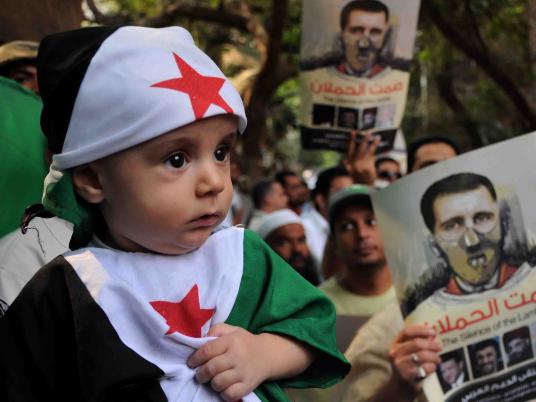
BEIRUT – Security forces killed at least six people in central Syria as thousands of anti-government protesters called for the downfall of the Syrian regime Sunday, the first day of the Muslim Eid al-Adha holiday, activists said.
The violence added to fears that a peace plan brokered by the Arab League last week was unraveling only days after Damascus agreed to halt its crackdown on the 7-month old uprising that the U.N. says has left some 3000 people dead.
On Sunday, government forces killed five people in the flashpoint central province of Homs, which has turned into one of the main centers of protest and reprisal during the revolt against President Bashar al-Assad.
Bloodshed linked to the military crackdown on dissent and what appear to be sectarian revenge killings have engulfed Homs in recent weeks, killing scores of people in the country's third-largest city.
The British-based Syrian Observatory for Human Rights said troops killed a sixth civilian in the city of Hama during raids in the restive region.
Troops also fired live ammunition to disperse protesters near Damascus and in the country's north as worshippers emerged from mosques to stage protests calling for Assad's ouster. There were no immediate reports of deaths but activists said several people were wounded in the northern Idlib province.
The protests came as state-run news agency SANA said Assad held Eid prayers at the al-Nour Mosque in the northern town of Raqqa, a divergence from the past few years when he held prayers in the capital Damascus. The town has seen anti-government protests in the past and the visit may be an attempt to show he is in control.
The Observatory later reported security raids in the town following Eid prayers Sunday in pursuit of protesters who organized a demonstration in response to an earlier pro-Assad protest.
The government has continued its offensive against protesters, despite the peace plan brokered by the Arab League on Wednesday in which Damascus agreed to halt its crackdown.
The head of the Arab League warned Saturday that the failure of the plan would have disastrous consequences.
The 22-nation bloc's secretary-general, Nabil al-Araby, expressed "deep worries and regret for the continuation of violence all around Syria" despite the deal announced at the Arab League's headquarters in Cairo.
The agreement called for the Syrian government to halt violence against protesters, but skeptical regime opponents who held large protests Friday to test the government's word were met with gunfire that killed more than 15 people, activists said.
On Saturday, activists reported more violence, including tank shelling, in Homs.
Under the Arab plan, Syria's government also agreed to pull tanks and armored vehicles out of cities, release political prisoners and allow journalists and rights groups into the country.
The continuous shelling four days after the Arab League deal was reached suggests Damascus is unwilling — or unable — to put a swift end to its crackdown.




